Who plans a work beach party in Zeeland?
The invitation in my inbox turned into a cycling adventure to a hidden beach
Surely the email invitation that had just arrived in my work inbox couldn’t be right. I had just been invited to a beach party three weeks from now... somewhere on the coast of Zeeland?
I work for an international company, one that sells software to people all over the world, which of course requires employees who are located all over the world. That doesn’t always mean there are physical offices where said employees can show up and work, which is the case for me and others who work in the Belgium, Netherlands and Luxembourg – Benelux. Most of us don’t even work together in the same parts of the company and never interact, so why should there be an expensive, fancy, wasteful office for us?
Working remotely is fine by me, and I believe for most of the other employees. Speaking for myself, almost all of my work is done inside my head and doesn’t require extensive collaboration. I’m also halfway around the world from most of the teams that I actually work with, on an island of sorts between San Francisco headquarters and the Australia outback. Because of this, I live a mostly meeting-free life, which makes me very efficient. I get a lot done in my comfy, quiet apartment in the summer with the doors and windows flung open to beautiful views from my balcony. Being extra remote from HQ also means that I get to shut my laptop at the end of my workday and hop on my bike for a long ride into the sunset while my colleagues in San Francisco squint at the rising sun and wipe the crumblies from their eyes while slurping their first sip of coffee.
Even though there isn’t a physical office for us Benelux employees, the company tries to arrange a few events each year to bring us together to nurture some sort of community. We usually meet in the middle in a cute city like Den Bosch because nobody from Amsterdam wants to travel four hours by train all the way to Brussels – and vice versa. The events are always fun and gezellig, with a tasty dinner that gives me plenty of opportunity to practice my Dutch, puzzle over the differences between Flemish and Dutch, and quiz the noobs who just moved to Amsterdam from abroad who don’t speak anything but English. However, this event, a beach event, was set, for some unfathomable reason, somewhere far, far away, on a hidden beach on the coast of one of the islands of Zeeland.
Who plans a work-related beach party in one of the most remote places of the Netherlands? On a Wednesday?? At 1 pm??? Did the organizer of the event plan to have it here because they already had a family vacation scheduled one beach over?
I was intrigued. What if I book-ended this beach party with a day of vacation on either side? I could explore a few of the islands of Zeeland and cycle over the Oosterscheldekering, the largest of the Delta Works.
Um... where is Zeeland, exactly?
If you’ve ever looked at a map of the Netherlands, you’ve probably noticed the funky looking peninsulas and islands at the bottom of the country. This province, Zeeland (‘Sealand’) is essentially a very large river delta where many of the most important commercial rivers of Europe dump out into the North Sea. It has historically been a place of terrible flooding, including a very destructive one in 1953 that took 1,800 souls and encouraged the Dutch government to conduct an enormous and ambitious series of engineering projects to close off the entire coast of Zeeland and its islands from the wildness of the North Sea. They built what is collectively known as the Delta Works, an elaborate series of dijks and dams and locks, which is sometimes (rightfully) considered one of the wonders of the modern world.
I still hadn’t visited this marvel of water engineering, even after nearly five years of living in the Netherlands. I had cycled through every one of the twelve Dutch provinces except for Zeeland, mostly because it’s not an easy place to get to, which is confirmed by the fact that it is also the least populated province. You can either approach it from the north via Rotterdam, which is a longer route that requires cycling across many bridges and hopefully catching seasonally available ferries, or you can begin in the south after rolling your bike off the train in Vlissingen, at the end of the line.
Why not say yes to this unexpected invitation to a nebulous, unnamed beach somewhere on the coast of Zeeland? Who in their right mind would take the trouble to attend? Most of the expat employees I know who live in Amsterdam don’t own an auto. Would they travel that far for a beach BBQ – maybe hitch a ride? I was curious to find out. But more importantly, I wanted to finally complete my goal of cycling in all twelve provinces of the Netherlands.
Island life under sea level
Zeeland is known for battling the water. The province’s motto is Luctor et Emergo which translates to “I struggle and surface”, not so subtly underscoring that this place has always been one that is more water than land.
If the name Zeeland sounds a bit familiar, it’s probably because it sounds like New Zealand, which was discovered by Dutch explorer Abel Tasman back in the 1600s, and subsequently name Nieuw Zeeland. If that explorer’s name Tasman sounds familiar, it’s because another big South Pacific island was named after him, Tasmania, although he himself called it Van Dieman’s Land. The legacy of these Dutch explorers, while long forgotten by most, live on as linguistic ghosts haunting the histories of far-flung ex-colonies around the globe, from New York (Nieuw-Amsterdam) to Jakarta (Batavia).
Zeeland itself has a long history of being passed from king to king, sometimes back and forth between old kingdoms like Holland and Flanders and various other European powers. Throughout it all, Zeeland was a haven for sailors, pirates, and privateers, including a very famous Dutch admiral, Michiel de Ruyter, who was perhaps a bit of all three. The son of a beer delivery man, this scrappy kid went to sea at age eleven (the traditional age for future seafarers) and never looked back, sailing to esteemed heights in his time.
My neighbourhood in Amsterdam, Bos en Lommer, is rife with the names of Dutch admirals, including de Ruyter. The largest canal near me is de Admiraalengracht, the canal of admirals. The street Admiraal de Ruijterweg is right around the corner from me. The street I live on, Jasper Leijnsenstraat, is named after a heroic crewman from an important battle. Right around another corner is the deliciously named Bestevaerstraat, which was an affectionate nickname given to Michel de Ruyter by his crew. Bestevaer = something like ‘best grandpa’.
The end of the line
The train to Vlissengen is about a three-hour ride. I got on with my bike at Sloterdijk Station, the closest station to my apartment, and I never had to switch trains, which is a testament to the Dutch train system. This particular route is a slow one, stopping at many stations along the way, which gives you plenty of time to take a nap or read a book or gaze at the passing sheep and cows and think. I had a lot to think about on this ride because a lot had happened in the past two months. I had been more social than usual, with lots of visitors to Amsterdam, including my son, who had spent his last summer after graduation and before adulthood with me. I was ready for some extended Dutch countryside views.
Right away, I could see that – just like nearly all of the other provinces of the Netherlands – Zeeland has good cycling paths, even better than most. The sheer amount of beachfront in this province attracts a lot of tourists, so the locals have made cycling their pristine paths a top value proposition for visitors.
On my first day, I left the station and headed north through the capital of Middelburg, on my way to catch the ferry to Noord-Beveland, one of the many islands of Zeeland that don’t have that many bridges connecting them. If you miss a ferry, it’s a long way to the next bridge. It’s often unclear if a ferry in the middle of nowhere will actually be running when you finally roll up to it, despite what some website somewhere said. Many of these ferries are small family-run operations and only sail in certain months of the year or on certain days of the week. They may only run a few times per day. It’s always a win when I manage to catch one.
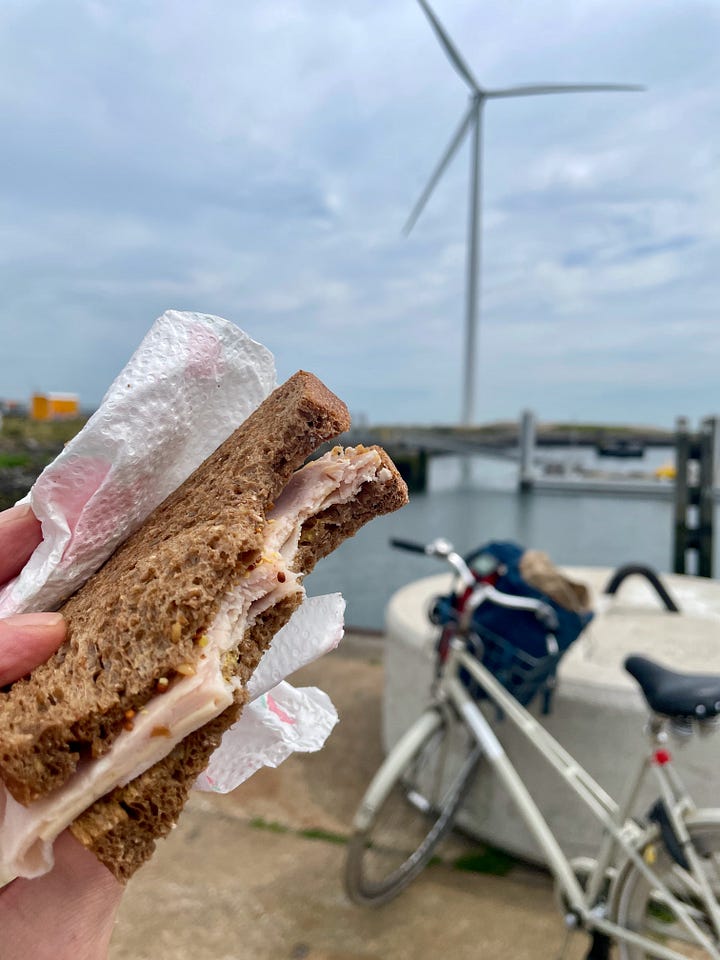

Duitser of Nederlander?
On the way to my bed-and-breakfast attic loft in Burgh-Hampstead on the island of Noord-Beveland, I was overwhelmed by the number of people I heard speaking German. I rolled into nearby Renesse on my way to the Albert Heijn to pick up some snacks and water, and while cycling through the streets along a canal next to a crowded terras I heard a Dutch waitress taking the order of a group of German tourists – in excellent German!
I like the Germans, even the loud, sunburned toeristen in cut-off jean shorts with tattoos, black socks and Birkenstocks. Judging by how many I encountered, the Duitsers appear to love Zeeland, presumably because it’s the closest seaside option by car. Just like the Dutch, the Germans love to travel, and I had a fun time playing a game of ‘Duitser of Nederlander?’ on the fietspad, trying to ascertain if the groups of cyclists I was passing were German tourists or Dutch locals. Should I smile and say Guten Tag or goedemiddag in passing? Maybe mumble something in between by mashing them both together as goedenmittag?
It made me slightly nostalgic to hear the language, reminding me of my initial European experience of living in Berlin, when I took a six-week intensive German class and began my journey toward learning a second language. That second language turned out to be Dutch when I somehow ended up in Amsterdam.
Those initial German classes were not for naught. They helped me understand the basic structure of Dutch. In some ways, Dutch feels like a simplified version of German, without all the nuance and insanity of memorizing tables of der, die, das articles.
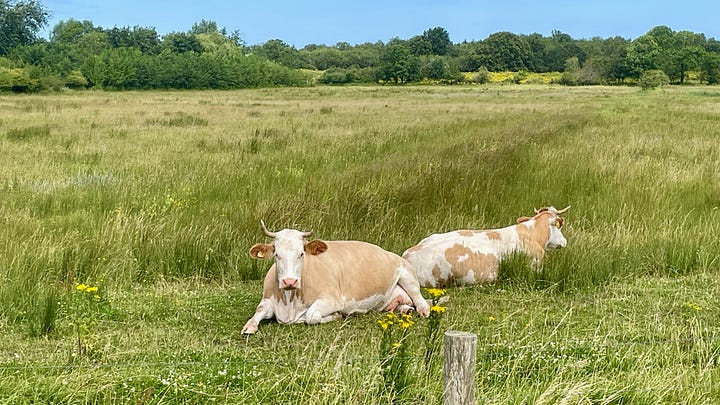
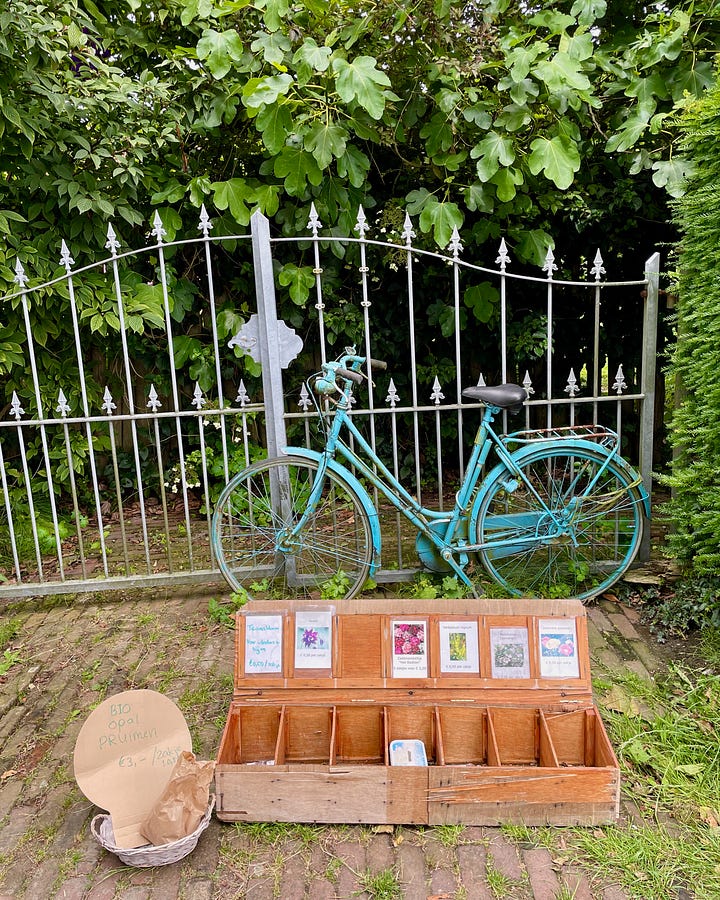
The pleasures and pains of language
German, the intellectual language, does seem to give thinkers a seemingly endless number of very flexible ways to get specific in what they want to describe and communicate. Dutch feels like a stripped down version of that, without all the bells and whistles. The Dutch seem more forgiving of grammatical errors, and they also seem to go into less detail. Maybe Dutch speakers assume that going into too much detail is a path to getting lost in the details, so they strive to keep things simple and to the point. My working hypothesis is that the Dutch focus on simplicity in their language is a choice and is, in fact, a virtue, not a limitation. I might need to talk that over with a Dutch thinker during a few late-night bullshit philosophy sessions over biertjes to confirm.
One thing I really like about the Dutch language is that, just like in German, you can create complex compound words by mashing multiple words together. I was a little worried that by switching to Dutch I would miss out on this playful aspect of German, which has some very long and interesting words, but the Dutch do it, too.
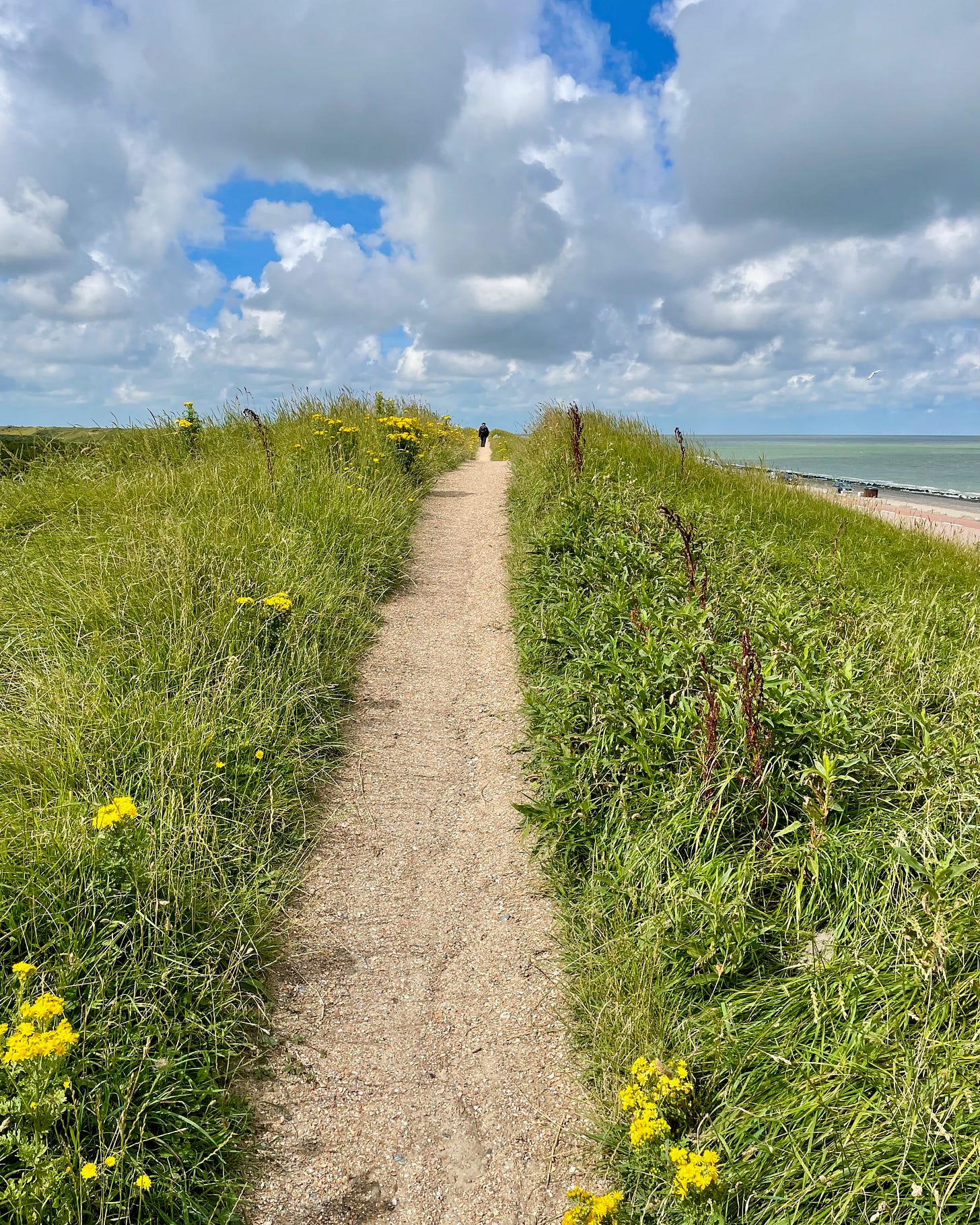
For example, in Dutch, if you want to go camping you might go to natuurkampeerterreinen - fields for camping in nature. An outdoor playground where children play is a kinderspeelplaats - kid play place. An indoor playground is a binnenspeeltuin - inside play garden. These kinds of compound words bring me joy when I discover them. Gloves are handschoenen – literally “hand shoes”! It is a ton of fun to try and create new compound words like this when you start to learn how the language works. In my limited experience, the Dutch seem to do it with less intricacy and incisiveness than the Germans, but just as creatively.
Both languages are, of course, capable of nuance. You might think that Schadenfreude, the German word for finding pleasure in the misfortune of others, is uniquely German, but the Dutch also have a word for it: leedvermaak, although it doesn’t sound quite as catchy. Believe it or not, there is an English equivalent, too: ‘epicaricacy’, which sounds clinical because it’s Greek. Although the origin of the English version is disputed (sounds reverse engineered to me), I would wager that both the English and Dutch versions originally migrated from the direction of Germany. As far as I’m concerned, you get credit for coming up with such an insidiously delicious idea, Duitsers.
Afspraak is afspraak
These are the things I think about on my rides, but I didn’t have a lot of time to dwell on the intricacies of language overheard op de fietspad on the first day of my trip because an unexpected Code Oranje storm blew in from the North Sea. I picked up my pace and sprinted the last 5 km, just in time to make it to my destination before the deluge hit. I opened up the louvered windows that were set into the roof of the loft apartment where I was staying to enjoy the wind breezing through the room and the sound of thunder and lightning before the intense rain began. Dozens of birds showed up after the storm to raise a fuss and survey the damage. Since it was still only late afternoon, I went on another long bike ride to explore the island.
One of the quirks of staying at bed and breakfasts or at small family-run hotels in the Netherlands is that they really want you to arrive early. In fact, they may be happy for you to check in at 2 pm. They do not want to be waiting around for touristen after 6 o’ clock. They always contact me many days in advance and ask me when I will arrive. This sometimes presents a challenge because I am cycling against the wind on an old single-speed second-hand bike. Cycling 60 km, stopping to take photos from time to time and enjoy the view, takes at least 6 hours. I am also notoriously bad at navigation, so I usually end up taking a lot of shortcuts that turn out to be the long way around. This suits me just fine, but it doesn’t make it easy to arrive on time, which is, of course, the most important Dutch virtue.
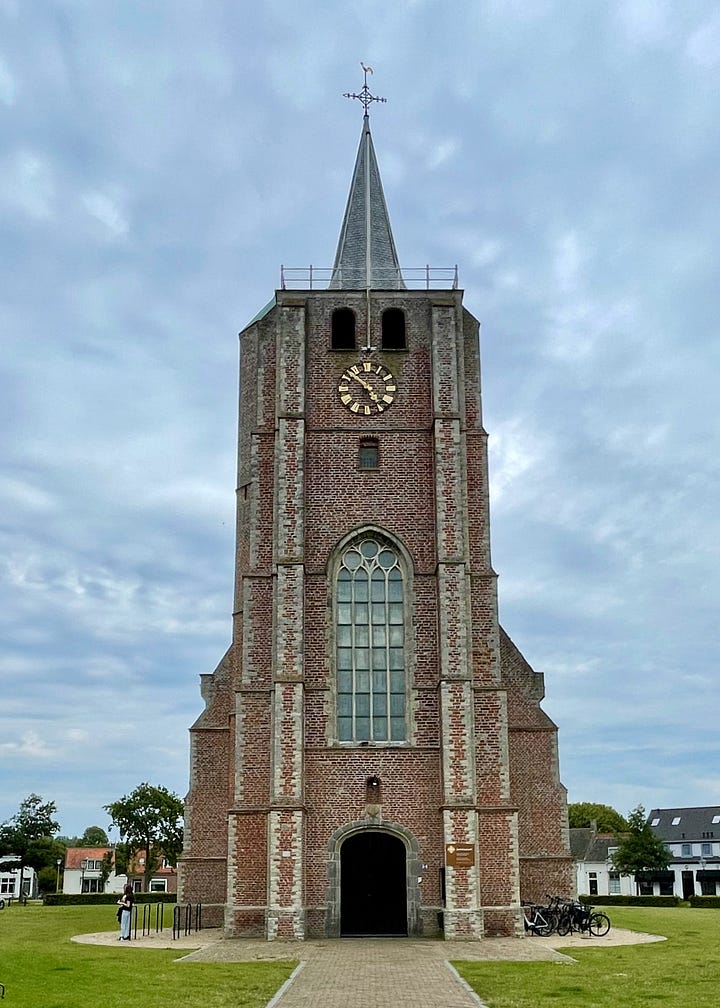
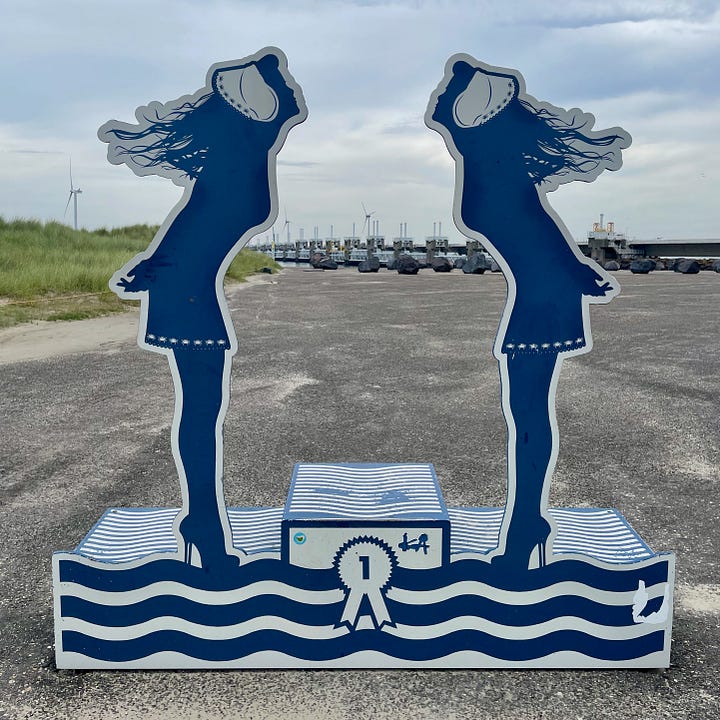
On the importance of appointments, the Dutch have a saying that I think is essential to understanding their culture, which is rooted in compromise and agreement: Afspraak is afspraak. An appointment is an appointment is one way to translate it.
We hebben een afspraak means we have an appointment. We are going to meet at the windmill on top of the dike on Monday at noon (rain or shine) and get back to pushing the water to the North Sea and reclaiming land with our rudimentary tools and engineering skills and Jaap’s boat. But the phrase afspraak is afspraak goes deeper. It also means an agreement is an agreement. It is akin to a promise is a promise.
Or, to put in American cowboy speak: a deal is a deal, pardner. You have to hold up your end of the bargain, which is to arrive on time, exactly at high noon. Maybe get there 5 minutes early just to be safe. Otherwise, Jaap is going to tan your hide (bruin je huid).
Oh, Oosterscheldekering
Zeeland has a little bit of everything, except for big cities. There are countless cute villages, heaps of farmland with cows and sheep, an astounding amount of water and coastline, birds galore, and, of course, windmills. Since there is a lot of coastline, there are also have many small lighthouses, many of which are painted white.
Why are so many lighthouses in Zeeland (and in other coastal parts of the world, for that matter) painted white? I haven’t been able to determine the definitive reason. Some say white is easier to see from far out at sea. Okay, sure. Dat klopt. Some say further that adding red or black stripes or designs help distinguish individual lighthouses. Jazeker. My Dutch teacher Marjan has a practical theory that I like better: the salty sea wind wears down the porous red-coloured bricks, so they add a protective white layer of paint. In any event, the lighthouses in the Netherlands can be stunningly beautiful, whether big or small, white or red, or whatever.
I began day two by cycling back across the Oosterscheldekering storm surge barrier, which I had already cycled over on day one. It’s 8 km long and, yes, it is a windy ride. They built an island called Neetje Jans to facilitate construction of the barrier, and this island has a number of very large wind turbines scattered about. You can cycle around on much of the island, and of course, like any true Dutch landmark, there is a museum. I usually just cycle by museums and landmarks, which I certainly did on this morning because I had a hidden beach to find if I wanted to be on time for my work beach party at 1 p.m…. on a Wednesday. Ik heb een afspraak!
Het feest op het strand
As I had expected – helaas – none of the other expat Amsterdammers that I usually see at these events went the extra distance to reach the hidden beach. But all of my favorite work Dutchies were there, having driven their own cars or caught a ride. Faisal, who actually lives in my neighborhood, rode his motorcycle all the way from Bos en Lommer, which I thought was pretty bad-ass. I was impressed at the number of people who showed. We were almost twenty festive Beneluxers strong.
We began the festivities with a famous Zeeland pastry called a bolus, which is colloquially in Dutch known as a “turd” because the way the dough is folded over makes it look like a pile of poop. It’s their version of a cinnamon bun, and boy is it ever sweet. I washed that turd down with a double espresso and rinsed the bowl of my mouth out with sparkling water.
The weather prospects for any beach party by the North Sea are a real crapshoot, but the sun came out. So did a kite. We took off our shoes and organised a disorganised beach volleyball game, which was a blast. Some swam in the sea. Everyone got sand between their toes. Jollity prevailed.
After a lekker barbeque, we all said doei-doei and trekked back a kilometre or two through the dunes and away from the sea. (Not even bicycles are allowed on the path to this beach.) Everyone agreed that it had been a supergezellig beach party, but more importantly that having to come so far was what made it feel extra special. I had to agree, but I didn’t envy them because they all had a long drive ahead of them. Me? I only had to cycle a few kilometres to a camping park near Oostkapelle, where I stayed in a surprisingly nice cabin with my own little terras, perfect for drinking a few more beers and watching the sunset. I slept peacefully.
Op zoek naar vuurtorens
I woke up with a hot face and the realisation that I had neglected to wear my hat during the beach volleyball game. Wat jammer. My face was beet red.
Thankfully, the sun on day three was more tempered by clouds, which were pushed around by powerful winds. I cycled the outside edge of the big island Zuid-Beveland, sometimes on top of the dijks, battling the wind for a good view of both the North Sea and the surrounding countryside, searching for lighthouses (vuurtoren).
Sometimes, you have a choice to ride on either side of a dijk so you can take shelter from the wind, and sometimes there are forests along the inner side of a dijk that are delightful to cycle through, especially when they’re sheltering you on a windy day. Which might be just about every day in Zeeland.
I took a wandering path on my way back to the train at Vlissingen – Domburg, Aagtekerke, Westkapelle, Zoutelande, all of which were peaceful and sleepy on a Thursday in the middle of summer.
I was also nice and sleepy by the time I carried my bike on the train and settled into a seat. Wat een leuke fietstocht. Besides a sunburned face and almost running into three enormous deer with sharp antlers in the Kop van Schouwen nature reserve, nothing had gone wrong. I had continued my streak of never getting a flat tire on a multi-day fietstocht. I had successfully spoken in Dutch to wayfarers I met along the way. Most importantly, I could finally cross Zeeland off the list of provinces cycled. I’ll be back, Zeeland – en naar alle de Nederlandse provincies. There’s still much more to explore.
Looking out the window with slowly dimming eyes, watching the long shadows of the setting sun as we crossed from Zeeland into Noord-Brabant, where the train passes not too far from the Belgian border, it suddenly occurred to me that I’ve only cycled in two of the ten provinces in Belgium.
Interresant idee.





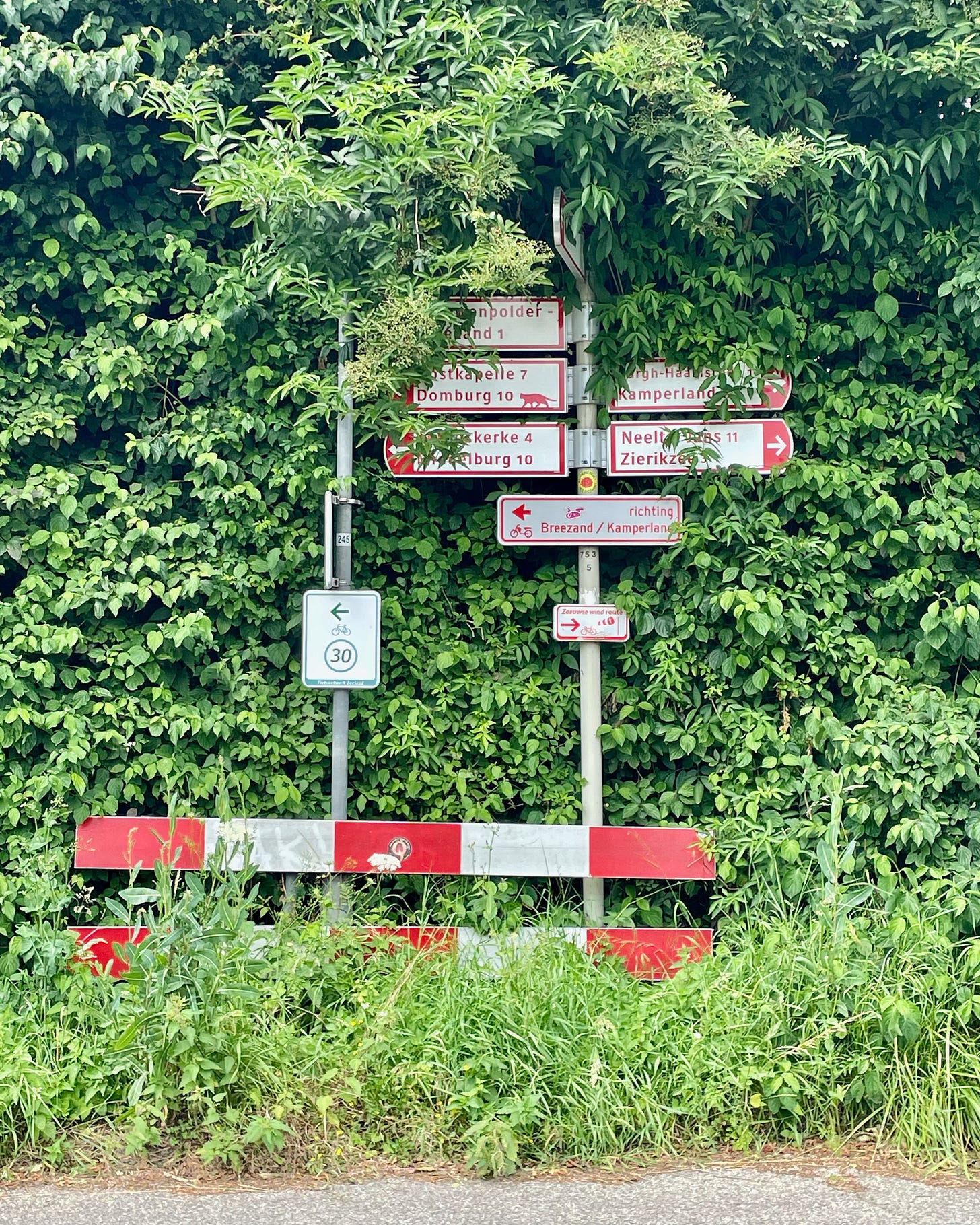


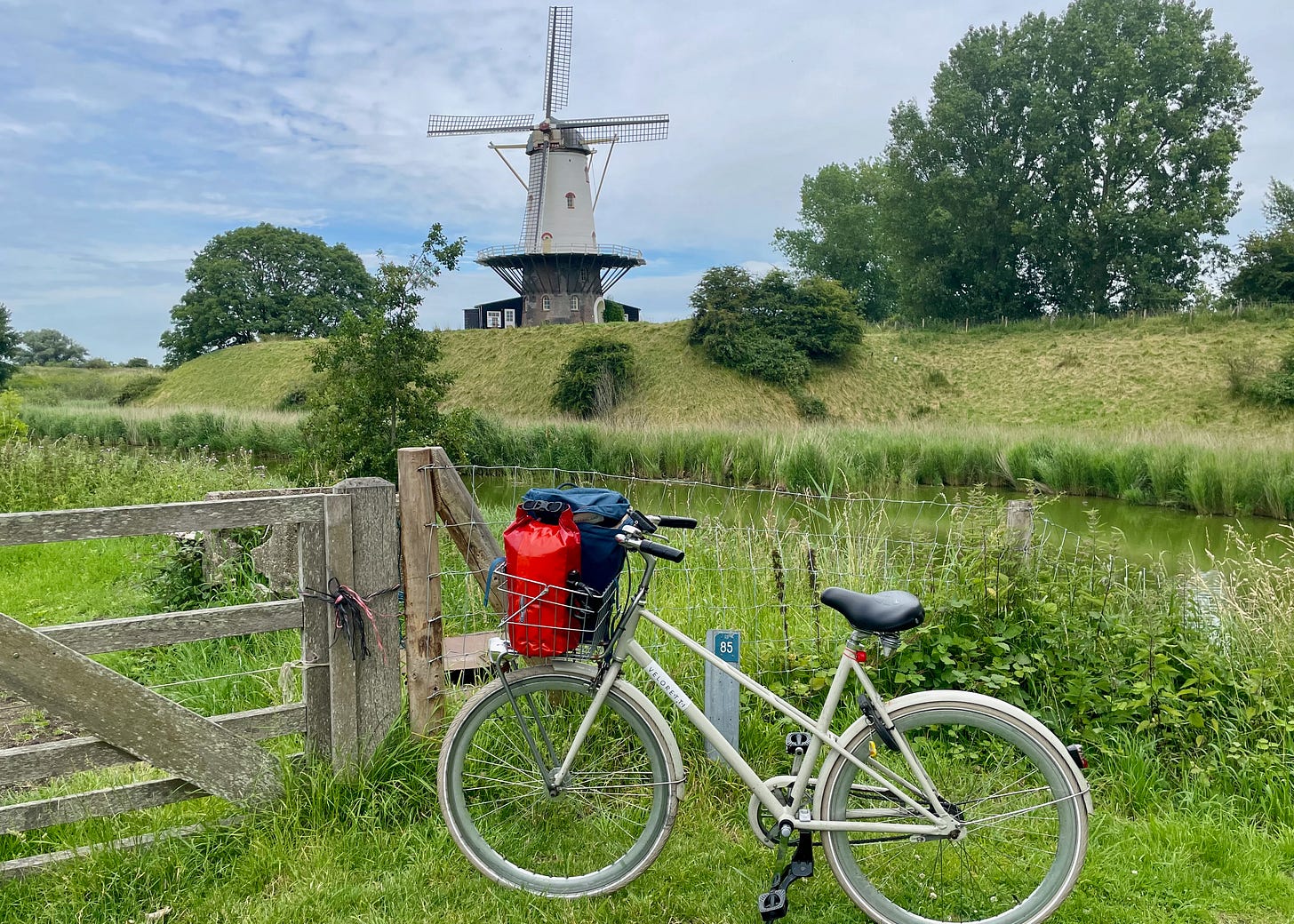
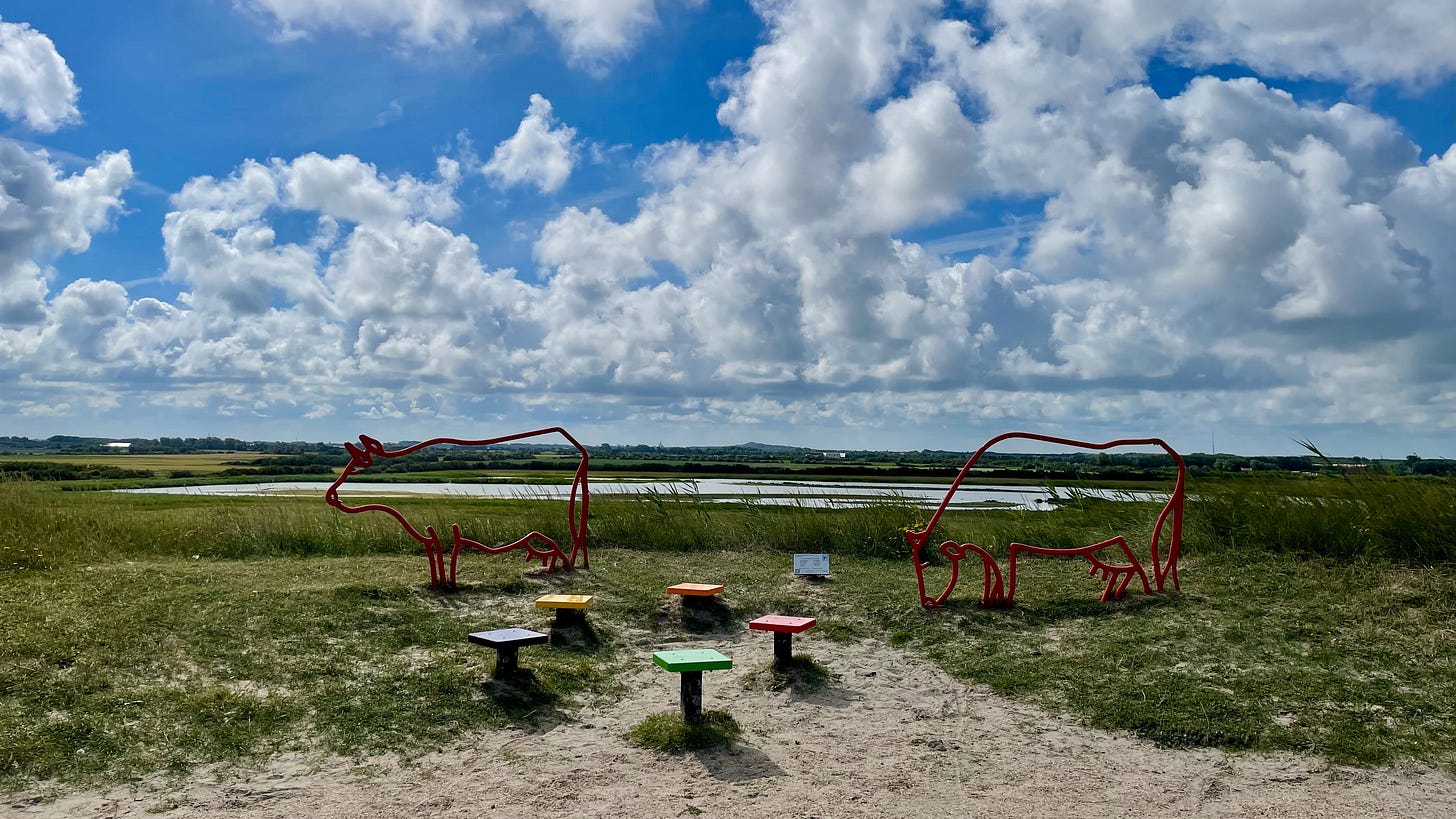
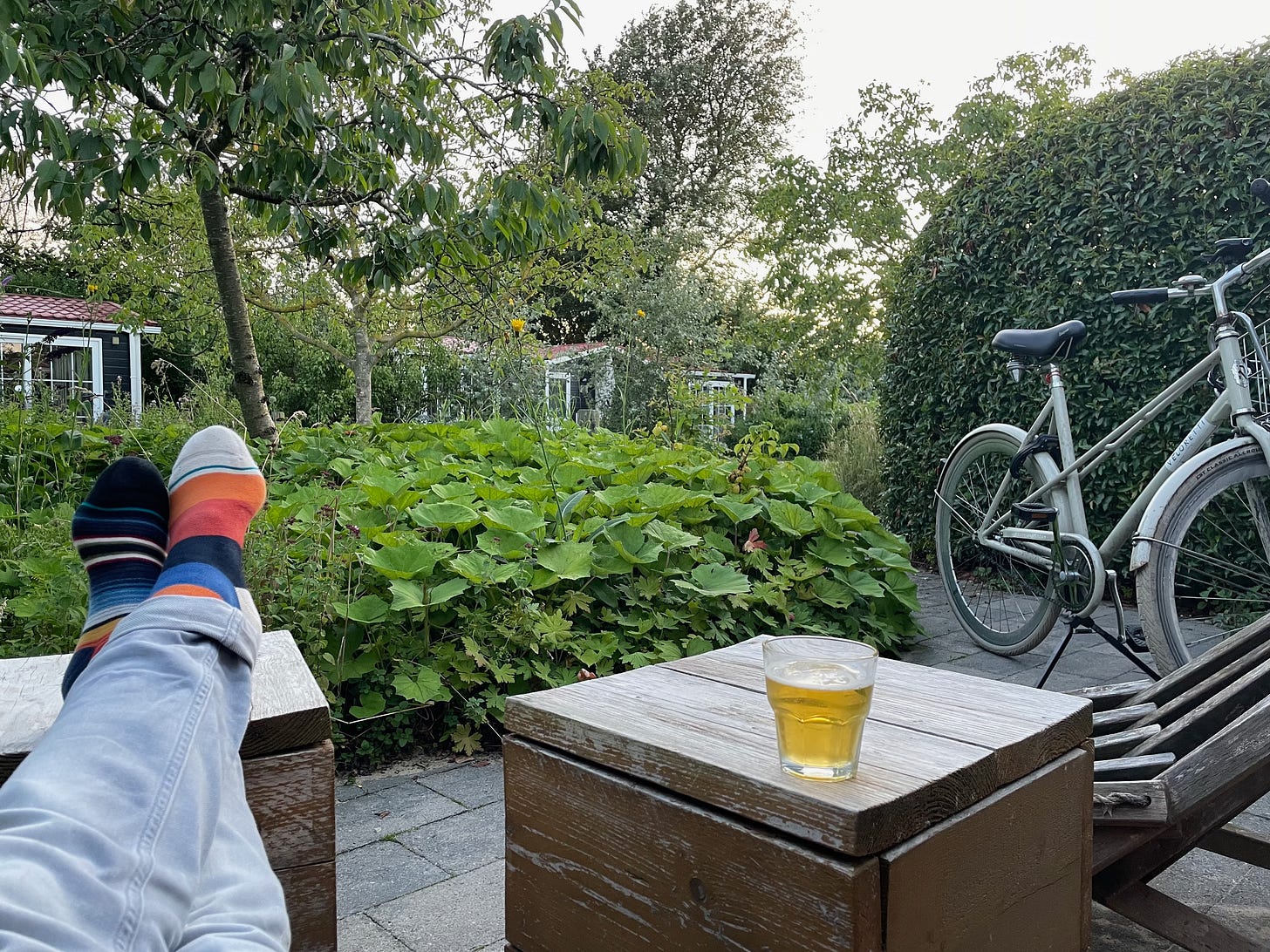

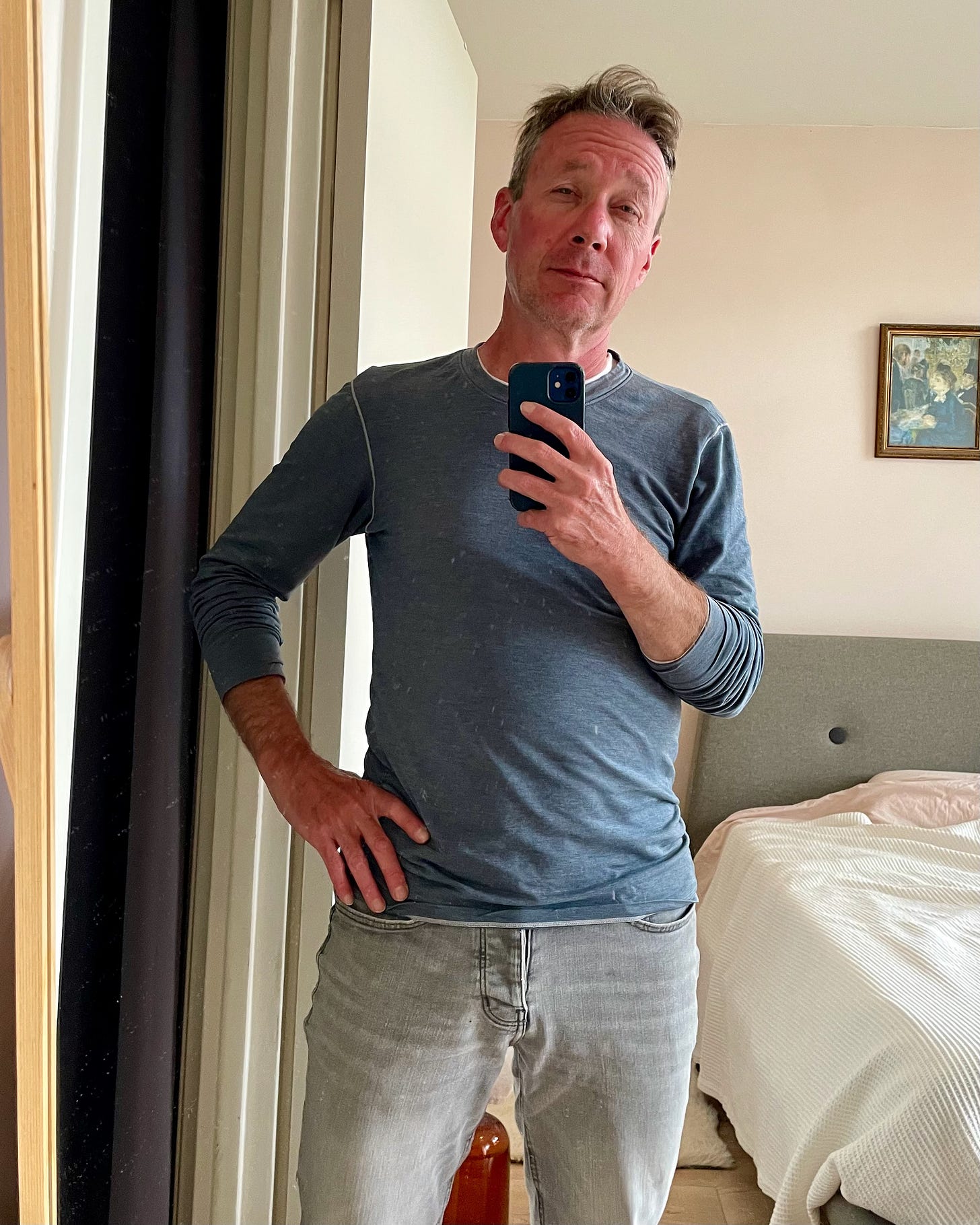
Well-written, brother. But I would expect nothing less.
Good adventure!